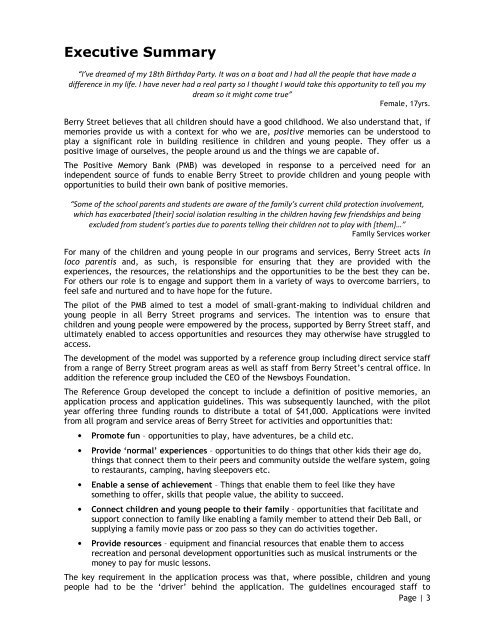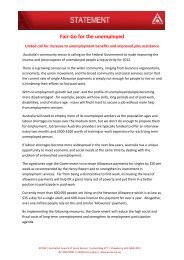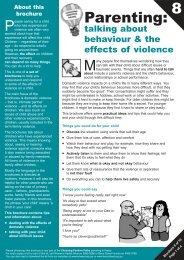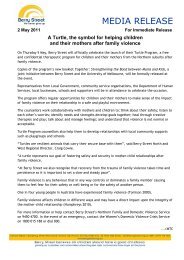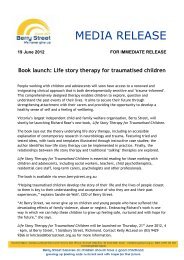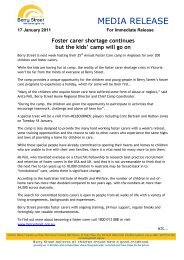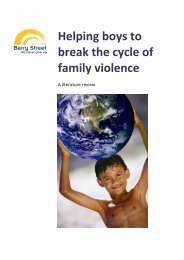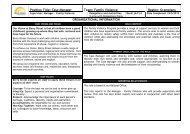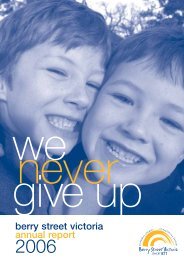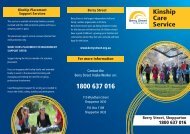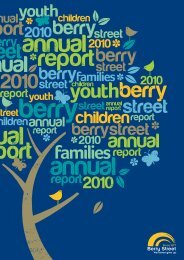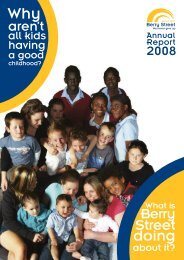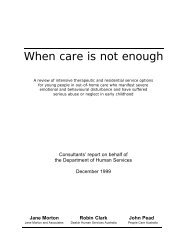Positive Memory Bank - Berry Street
Positive Memory Bank - Berry Street
Positive Memory Bank - Berry Street
Create successful ePaper yourself
Turn your PDF publications into a flip-book with our unique Google optimized e-Paper software.
Executive Summary<br />
“I’ve dreamed of my 18th Birthday Party. It was on a boat and I had all the people that have made a<br />
difference in my life. I have never had a real party so I thought I would take this opportunity to tell you my<br />
dream so it might come true”<br />
Female, 17yrs.<br />
<strong>Berry</strong> <strong>Street</strong> believes that all children should have a good childhood. We also understand that, if<br />
memories provide us with a context for who we are, positive memories can be understood to<br />
play a significant role in building resilience in children and young people. They offer us a<br />
positive image of ourselves, the people around us and the things we are capable of.<br />
The <strong>Positive</strong> <strong>Memory</strong> <strong>Bank</strong> (PMB) was developed in response to a perceived need for an<br />
independent source of funds to enable <strong>Berry</strong> <strong>Street</strong> to provide children and young people with<br />
opportunities to build their own bank of positive memories.<br />
“Some of the school parents and students are aware of the family’s current child protection involvement,<br />
which has exacerbated [their] social isolation resulting in the children having few friendships and being<br />
excluded from student’s parties due to parents telling their children not to play with [them]…”<br />
Family Services worker<br />
For many of the children and young people in our programs and services, <strong>Berry</strong> <strong>Street</strong> acts in<br />
loco parentis and, as such, is responsible for ensuring that they are provided with the<br />
experiences, the resources, the relationships and the opportunities to be the best they can be.<br />
For others our role is to engage and support them in a variety of ways to overcome barriers, to<br />
feel safe and nurtured and to have hope for the future.<br />
The pilot of the PMB aimed to test a model of small-grant-making to individual children and<br />
young people in all <strong>Berry</strong> <strong>Street</strong> programs and services. The intention was to ensure that<br />
children and young people were empowered by the process, supported by <strong>Berry</strong> <strong>Street</strong> staff, and<br />
ultimately enabled to access opportunities and resources they may otherwise have struggled to<br />
access.<br />
The development of the model was supported by a reference group including direct service staff<br />
from a range of <strong>Berry</strong> <strong>Street</strong> program areas as well as staff from <strong>Berry</strong> <strong>Street</strong>’s central office. In<br />
addition the reference group included the CEO of the Newsboys Foundation.<br />
The Reference Group developed the concept to include a definition of positive memories, an<br />
application process and application guidelines. This was subsequently launched, with the pilot<br />
year offering three funding rounds to distribute a total of $41,000. Applications were invited<br />
from all program and service areas of <strong>Berry</strong> <strong>Street</strong> for activities and opportunities that:<br />
• Promote fun – opportunities to play, have adventures, be a child etc.<br />
• Provide ‘normal’ experiences – opportunities to do things that other kids their age do,<br />
things that connect them to their peers and community outside the welfare system, going<br />
to restaurants, camping, having sleepovers etc.<br />
• Enable a sense of achievement – Things that enable them to feel like they have<br />
something to offer, skills that people value, the ability to succeed.<br />
• Connect children and young people to their family – opportunities that facilitate and<br />
support connection to family like enabling a family member to attend their Deb Ball, or<br />
supplying a family movie pass or zoo pass so they can do activities together.<br />
• Provide resources – equipment and financial resources that enable them to access<br />
recreation and personal development opportunities such as musical instruments or the<br />
money to pay for music lessons.<br />
The key requirement in the application process was that, where possible, children and young<br />
people had to be the ‘driver’ behind the application. The guidelines encouraged staff to<br />
Page | 3


